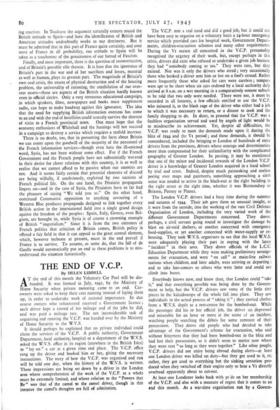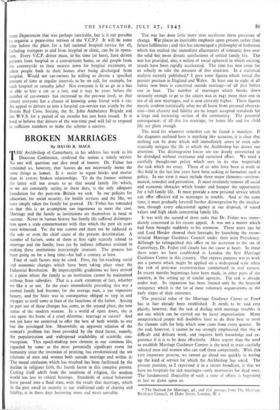THE END OF V.C.P.
By HELEN LIDDELL
AT the end of this month the Voluntary Car Pool will be dis- banded. It was formed in July, 1942, by the Ministry of Home Security when private motoring came to an end. Car- owners were asked to keep their cars running instead of laying them up, in order to undertake work of national importance. In due course owners who volunteered received a Government licence ; each driver kept a record of his mileage and of the jobs he did, and was paid a mileage rate. The not inconsiderable task of organising and running the V.C.P. was handed over by the Ministry of Home Security to the W.V.S.
It should perhaps be explained that no private individual could claim the services of the V.C.P. A public authority, Government Department, local authority, hospital or a department of the W.V.S. asked the W.V.S. office in its region (anywhere in the British Isles) to " lay on" a car at a given time and place. The V.C.P. office rang up the driver and booked him or her, giving the necessary instructions. The story of how the V.C.P. was organised and run will be told one day, when the history of the W.V.S. is written. These impressions are being set down by a driver in the London area whose comprehension of the work of the V.C.P. as a whole must be extremely limited, and whose relation to the "Powers that Be" was that of the camel to the camel driver, though in this instance the camel's thoughts are full of admiration. The V.C.P. met a real need and did a good job, but it could not have been easy to organise on a voluntary basis a 24-hour emergency service which provided cars for hospital work, Government Depart- ments, children-evacuation schemes and many other requirements. During the Vi season all concerned in the V.C.P. presumably recognised the urgency of their work, but, except perhaps in this crisis, drivers did exist who refused to undertake a given job because they had " somebody coming to tea." They were rare, but they existed. Nor was it only the drivers who erred ; very occasionally those who booked a driver sent him or her on a fool's errand. Rather more frequently those who asked for cars were careless ; tempers were apt to be short when six cars ordered by a local authority duly arrived at 8 a.m. on a wet morning in a comparatively remote suburb to be told that two only were needed. There were too, it must be recorded in all honesty, a few officials entitled to use the V.C.P. who misused it, to the black rage of the driver who either had a job to which it was necessary to return, or a dinner to cook and the family shopping to do. In short, to pretend that the V.C.P. was a faultless organisation served and used by angels of light would be to misdescribe its achievement. Yet, despite all difficulties, the V.C.P. was ready to meet the demands made upon it during the blitz of 1944 and the VI period ; and those demands, it should be remembered, included the bringing to London of hundreds of extra drivers from the provinces, drivers whose courage and determination more than compensated for their unfamiliarity with the complicated geography of Greater London. In passing, it may be mentioned that one of the minor and incidental rewards of the London V.C.P. driver is a knowledge of Greater London acquired in a hard school by trial and error. Indeed, despite much painstaking and useless poring over maps and gazetteers, something approaching a sixth sense was needed to arrive in the black-out at the right building in the right street at the right time, whether it was Bermondsey or Brixton, Putney or Pinner.
The London V.C.P. drivers had a busy time during the summer and autumn of 1944. Their job gave them an unusual insight, as it were from the outside, into the working of the vast Civil Defence Organisation of London, including the very varied work of the different Government Departments concerned. They drove. perhaps, a civil servant going round to investigate the damage by blast on air-raid shelters, or another concerned with emergency food-supplies, or yet another concerned with water-supply or re- housing. They took W.V.S. organisers to see that the local W.V.S. were adequately playing their part in coping with the latest "incident" in their area. They drove officials of the L.C.C. Education Department while they were making preliminary arrange- ments for evacuation, and were "on call" at main-line railway stations when children, and later adults, were arriving or departing ; and to take late-corners or others who were lame and could not climb into buses.
Everybody knows now, and knew then, that London could " take it," and that everything possible was being done by the Govern- ment to help, but the V.C.P. drivers saw some of the little tiny pieces in the kaleidoscope of the whole fall .into place. They saw individuals in the actual process of " taking it " ; they carried clothes from a W.V.S. depot to a rest-centre for the bombed-out. While the passenger did his or her official job, the driver sat depressed and miserable for an hour or more at the scene of an incident, watching people searching the debris for some remnant of their possessions. They drove old people who had decided to take advantage of the Government's scheme for evacuation, who said without bitterness that they had been bombed-out in the blitz and had lost their possessions, so it didn't seem to matter now where they were sent " so long as they were together." Like other people, V.C.P. drivers did not enjoy being abroad during alerts—at least one London-driver was killed on duty—but they got used to it, or, rather, they got used to everything but the sinking sensation pro- duced when they switched off their engine only to hear a Vi directly overhead apparently about to cut-out.
At least one Londoner looks back with pride on her membership of the V.C.P. and also with a measure of regret that it comes to an end this month. As a war-time organisation run by a Govern-
ment Department that was perhaps inevitable, but is it not possible to organise a peace-time version of the V.C.P.? It will be some time before the plans for a full national hospital service for all, including transport to and from hospital or clinic, can be in opera- tion. Every V.C.P. driver must, in his time (or hers), have driven patients from hospital to a convalescent home, or old people from the countryside to their nearest town for hospital treatment, or taken people back to their homes after being discharged from hospital. Would not car-owners be willing to devote a specified amount of time at regular intervals to be on call, for example, for such hospital or casualty jobs? Not everyone is fit to go in a bus or able to hire a car or a taxi, and it may be years before the number of car-owners has increased to the pre-war level, so that almost everyone has a chance of knowing some friend with a car. An appeal to drivers to join a hospital car-service run jointly by the British Red Cross Society, the St. John Ambulance Brigade and the W.V.S. for a period of six months has just been issued. It is hard to believe that drivers of the war-time pool will fail to respond in sufficient numbers to make the scheme a success.



























 Previous page
Previous page